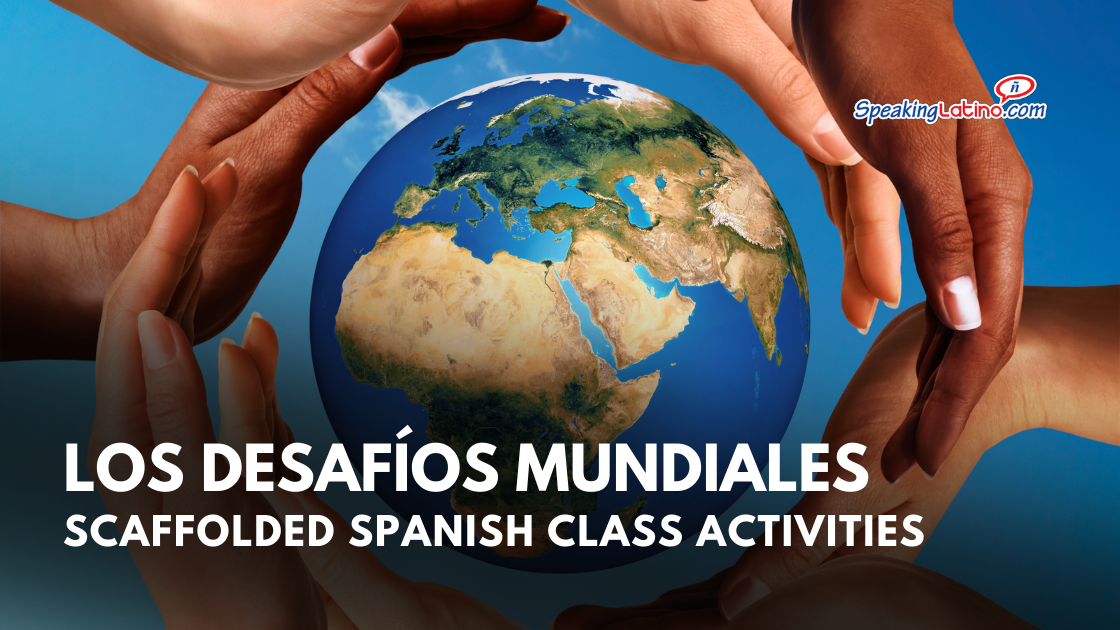
Explore global challenges across all student's level with these activities featuring Puerto Rico and Equatorial Guinea. They will get to explore topics like natural disasters, environmental conservation, social challenges, and cultural aspects. It's all about real-world issues while improving their Spanish skills.
3 Proficency Levels for Each Activity
Each activity provides tasks and exercises that are tailored to the specific language abilities of each group so they can engage meaningfully with the content and continue to develop their language skills.
- Novice Students: The activities focus on basic comprehension tasks such as identifying images, answering questions in English, and completing sentences with vocabulary from the text. These tasks help build foundational language skills and vocabulary .
- Intermediate Low/Mid Students: These students engage in more complex tasks like transforming nouns into adjectives, describing images in Spanish, and practicing dialogues related to social interactions. These activities aim to enhance language proficiency and communication skills at a mid-level .
- Intermediate High/Advanced Students: Advanced students work on more challenging exercises such as filling in missing words in a text, composing emails or letters, and analyzing videos for deeper comprehension. These tasks encourage critical thinking, advanced language usage, and cultural analysis.
Los Desafíos Mundiales: 8 Scaffolded Cultural Activities
Bahía bioluminiscente – El medioambiente
 In this reading comprehension activity, students learn about Bahía Bioluminiscente in Puerto Rico, a bio-bay with micro-organisms that glows in the night.
In this reading comprehension activity, students learn about Bahía Bioluminiscente in Puerto Rico, a bio-bay with micro-organisms that glows in the night.
Why your students will ❤️ this activity:
They’ll learn about a natural wonder and reflect on how important it is to protect the environment.
- Novice students read a text from the web, identify the best title for each segment, and learn vocabulary in context.
- Intermediate Low/Mid students answer the questions in Spanish.
- Intermediate High/Advanced students read a longer and more detailed text, elaborate their answers, also giving an opinion about why it is important to protect these habitats.
Eco-Schools Puerto Rico – El medioambiente
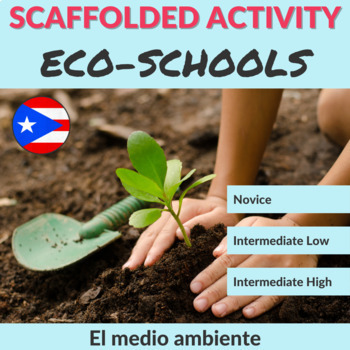 In this visual and reading Comprehension activity, students read the website of OPA, an organization from Puerto Rico that helps the community and Eco schools after natural disasters.
In this visual and reading Comprehension activity, students read the website of OPA, an organization from Puerto Rico that helps the community and Eco schools after natural disasters.
Why your students will ❤️ this activity:
They have the chance to study natural disasters, understand how an NGO works, and they may even get involved in activities for the good of the community!
- Novice students read the text on the website, look at the images, and answer questions written in English.
- Intermediate Low/Mid students answer the questions in Spanish and compare the work of the organization to similar initiatives in their cities.
- Intermediate High/Advanced students brainstorm their ideas to do a cultural comparison explaining how disasters affect the life and economy of a region.
El Yunque – El medioambiente
 In this reading comprehension activity, students read about the Puerto Rican National Park El Yunque, and look at images to learn vocabulary.
In this reading comprehension activity, students read about the Puerto Rican National Park El Yunque, and look at images to learn vocabulary.
Why your students will ❤️ this activity:
The students will enjoy visiting a National Park, learning about exotic animals and wildlife, and producing ideas to preserve the forests!
- Novice students read a text from a website, identify the images with words from the text, and try to understand the meaning.
- Intermediate Low/Mid students read the text, learn the vocabulary in context, and write a postcard in Spanish using the simple past.
- Intermediate High/Advanced students read a more detailed text with information about the forests and write a formal letter to the government expressing their concerns for the poor conservation of the park.
Huracanes – El medioambiente
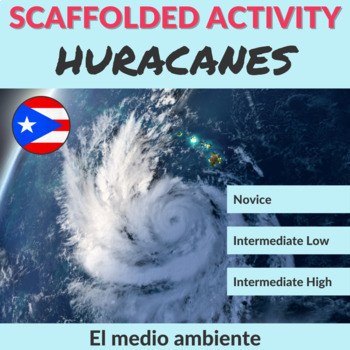 In this Visual Interpretation activity, the students read and answer questions about Hurricanes in Puerto Rico, how they affect its citizens and the economy, and which were the worst climate catastrophes on the island.
In this Visual Interpretation activity, the students read and answer questions about Hurricanes in Puerto Rico, how they affect its citizens and the economy, and which were the worst climate catastrophes on the island.
Why your students will ❤️ this activity:
They will be able to reflect on the effects of a major natural disaster in a community by recording a video.
- Novice students read a short text about Puerto Rico and hurricanes and study a chart with the worst hurricanes in history. Then, they answer questions written in English and learn weather vocabulary in context.
- Intermediate Low/Mid students are encouraged to answer the questions and express their opinion in Spanish.
- Intermediate High/Advanced students pretend to be a victim of a hurricane and record a video explaining their experience and asking for help.
Explosiones en Bata – Bienestar Social
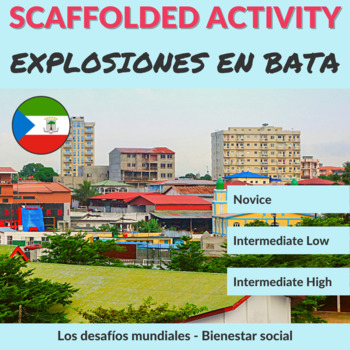 In this reading comprehension activity, students read about a volunteer job opportunity for an environmental assistant to help after a series of explosions that occurred in the city of Bata and complete a series of tasks to practice cognates, infinitive verbs, nouns, and adjetives.
In this reading comprehension activity, students read about a volunteer job opportunity for an environmental assistant to help after a series of explosions that occurred in the city of Bata and complete a series of tasks to practice cognates, infinitive verbs, nouns, and adjetives.
- Novice students identify the three sections of the job posting related to the volunteer opportunity in Bata, Guinea Ecuatorial and answer the reading comprehension questions.
- Intermediate Low/Mid students answer questions about the events in Bata and the volunteer position requirements, transform nouns into adjectives and verbs into nouns from specific sections, and provide synonyms and antonyms for relevant words.
- Intermediate High/Advanced students fill in missing words in the text based on the article’s context, write questions and responses for a job announcement and a job interview scenario, answer questions with personal responses related to the content, translate a specific phrase into Spanish, and identify synonyms and antonyms for provided words related to the content.
Imágenes de Guinea Ecuatorial – Bienestar Social
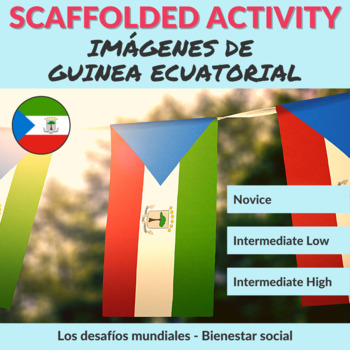 In this speaking production activity, students use a series of images from Equatorial Guinea to complete vocabulary tasks (novice and intermediate low-mid students) or express their opinion and produce a written piece.
In this speaking production activity, students use a series of images from Equatorial Guinea to complete vocabulary tasks (novice and intermediate low-mid students) or express their opinion and produce a written piece.
- Novice students identify images, categorize words found in the images, use vocabulary with the verb “haber” to describe what is and isn’t present in the images, and practice introducing themselves in a scenario with new people using provided phrases.
- Intermediate Low/Mid students describe the images of Guinea Ecuatorial in Spanish, practice dialogues with phrases related to meeting new people and social interactions and use vocabulary from the images to write sentences.
- Intermediate High/Advanced students perform a detailed comparison between two images, focusing on similarities and differences, compose an email to a friend outlining the most surprising aspects of their trip to Guinea Ecuatorial, and answer questions aloud related to the images, including observations, transportation in the country, activities depicted, potential sources of income, areas for improvement.
La dictadura de la que nadie habla – Conciencia Social
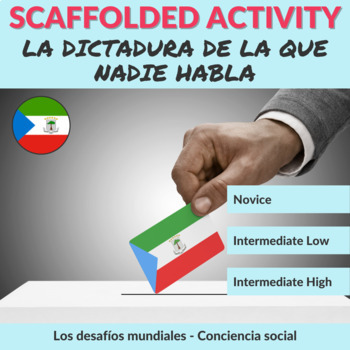 In this audiovisual interpretative communication activity, students watch an authentic video (or fragment) that features general aspects of Equatorial Guinea’s history. They complete different tasks to practice their comprehension of the video (novice and intermediate low-mid students) and produce a written piece (intermediate high-advanced students).
In this audiovisual interpretative communication activity, students watch an authentic video (or fragment) that features general aspects of Equatorial Guinea’s history. They complete different tasks to practice their comprehension of the video (novice and intermediate low-mid students) and produce a written piece (intermediate high-advanced students).
- Novice students identify cognates related to the topic, complete sentences with appropriate vocabulary and discuss themes presented in the video, such as Geography, History, Government and Economy, and Guinea Equatorial’s relationship with the world.
- Intermediate Low/Mid students choose the correct answers from multiple-choice questions about Guinea Ecuatorial, identifying true or false statements about the country, respond to questions about location, capital, exports, language, historical discoveries, Olympic participation, and aspects that surprised them about the country, and expressing their interest in visiting and providing reasons for their choice.
- Intermediate High/Advanced students answer questions regarding various aspects of the country’s history, politics, and international relations, choose to write either a letter to the embassy requesting an interview with the president or a list of questions for him, and provide synonyms for specific words mentioned in the video to demonstrate understanding and vocabulary expansion.
Testimonios de Ecuatoguineanos – Conciencia social
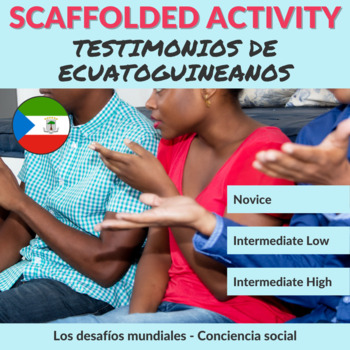 In this audiovisual interpretative communication activity, students watch an authentic video of people from Equatorial Guinea reflecting on the 50th Independence Day anniversary from Spain.
In this audiovisual interpretative communication activity, students watch an authentic video of people from Equatorial Guinea reflecting on the 50th Independence Day anniversary from Spain.
- Novice students complete the sentences from the video by choosing the correct option, fill in the blanks with the numbers mentioned in the video using words, write 10 words incorporated into the RAE dictionary from Equatorial Guinea and identify other Spanish words with the same meaning, complete the occupations of the interviewees in the video.
- Intermediate Low/Mid students complete the sentences from the video, select 5 words of Equatoguinean origin and use them in context by writing 5 sentences, and determine if the statements presented are true or false based on the information provided in the video.
- Intermediate High/Advanced students listen attentively and answer questions about the individuals’ experiences and perspectives, write a general summary of the opinions expressed in the video regarding Guinea Equatorial’s 50 years of independence, define and provide examples of idiomatic expressions used in the video, and select and use three words of Equatoguinean origin in sentences to demonstrate comprehension and application of vocabulary.
Opportunities to Develop 10 Language Skills
With these activities, students can improve their language abilities while exploring meaningful content related to Spanish language and culture.
- Reading Comprehension - Improve their ability to understand and interpret written texts in Spanish with reading activities about topics like natural disasters, environmental conservation, and social challenges.
- Vocabulary Acquisition - Through exposure to new words and phrases in the context of wildlife, conservation efforts, cultural comparisons, and historical events.
- Listening Comprehension - By watching authentic videos.
- Speaking Skills - Activities that involve discussions, role-plays, and presentations allow students to practice speaking in Spanish and express their opinions.
- Writing - By completing tasks such as writing postcards, formal letters, emails, job announcements, and interview questions in Spanish.
- Grammar Practice - Reinforce grammar concepts such as verb conjugation, sentence structure, adjective-noun agreement, and idiomatic expressions.
- Cultural Awareness - Students can develop a deeper understanding of diverse cultures, traditions, and global perspectives.
- Critical Thinking - With tasks that require students to analyze, compare, and evaluate information from different sources to form well-reasoned opinions and arguments in Spanish.
- Interpersonal Communication - Collaborative activities that involve group work, peer discussions, and presentations.
- Cross-Cultural Competence - Students can develop cross-cultural competence, empathy, and a broader perspective on the interconnectedness of the Spanish-speaking world.
Tips to Integrate Global Challenges Scaffolded Activities Into Your Spanish Curriculum
- Determine the proficiency levels of your students to assign them the appropriate version of each activity, ensuring that the tasks align with their language skills .
- Tweak the activities to suit the specific needs and interests of your students. You can modify tasks, provide additional resources, or create extensions to cater to diverse learning styles. For example, you can allow your novice students to complete some taks in English.
- Encourage active participation by incorporating interactive elements such as group discussions, role-plays, or multimedia presentations. You decide if some tasks should be completed individually or in groups.
- Emphasize the cultural aspects embedded in the activities to broaden students' understanding of Spanish-speaking countries. Encourage discussions on social issues, traditions, and current events to enhance cultural awareness .
- Offer constructive feedback to students on their performance in the activities to reinforce learning outcomes and encourage continuous improvement. Feedback can be given through peer evaluations or class discussions. Use the teacher notes for each activity to see the pre, during, and post activity strategies to get glipmse of what students can be capable of doing.
Endless Options to Explore More Cultural Themes
Explore the additional set of activities to enrich your Spanish classes with a wider range of cultural topics tailored to every proficiency level.
1. La belleza y la estética - Activities tailored to different proficiency levels, exploring diverse cultural topics related to beauty, aesthetics, and heritage in Argentina, Colombia, and Ecuador. Through a combination of reading comprehension, vocabulary building, and critical thinking exercises, students enhance their Spanish language skills while gaining valuable insights into the richness of Spanish-speaking cultures.
2. La Identidad Pública y Privada - These suggested activities designed around the AP Spanish theme of La identidad pública y privada or public identities in the Spanish-speaking world, but they have been also adapted for students at novice and intermediate proficiency levels.
3. La Vida Contemporánea - This set of activities cover cultural topics such as canopy tours in Monteverde, Costa Rica, bullfighting in Spain, Antonio Gaudí’s architecture in Barcelona, and the Plaza de España. These topics offer insights into diverse aspects of Hispanic culture, fostering intercultural understanding and language proficiency among students.
4. Las Familias y las Comunidades - Dive into traditions, values, and challenges faced by families and communities in the Spanish-speaking world with differentiated activities featuring Peru, Dominican Republic, Chile, and Uruguay.
5. La Ciencia y la Tecnología - Students engage in various activities that explore the theme of science and technology in Colombia, Paraguay, Guatemala, Cuba, and among indigenous communities.
6. Los Desafíos Mundiales - Explore global challenges across all student's level with these activities featuring Puerto Rico and Equatorial Guinea. They will get to explore topics like natural disasters, environmental conservation, social challenges, and cultural aspects. It's all about real-world issues while improving their Spanish skills.
7. Afro-Latinos Scaffolded Cultural Activities - Use these scaffolded activities in any order during Black History Month or through the school year. Each activity includes 3 versions to use with novice, intermediate low-mid, and intermediate high-advanced students.